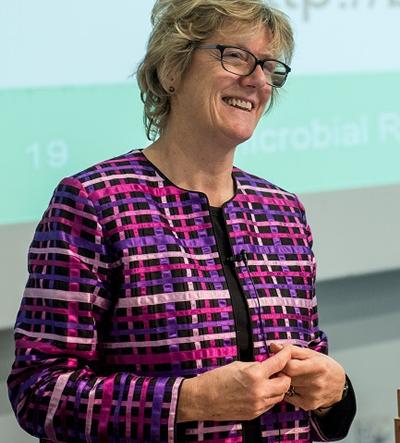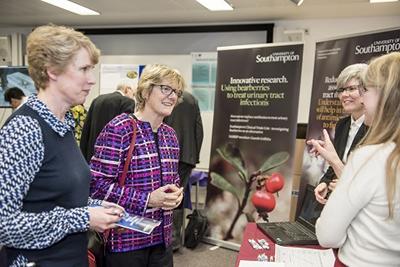Dame Sally Davies, UK Government Chief Medical Officer, has praised the University of Southampton for the way it has approached the challenge of anti-microbial resistance

In her keynote address at the official launch conference of the University’s Network for Anti-Microbial Resistance and Infection Prevention (NAMRIP) earlier this week, Dame Sally said: "This event is a fantastic example of how we need to work together to solve this global issue. The strength of Southampton’s approach is on show for all to see."
The conference was all about Antimicrobial Resistance and Infection Prevention. The break-out rooms featured an exhibition of inventions to tackle this threat while in the main hall there were talks by scientists, engineers, clinicians, social scientists, geographers and lawyers. The opening address was given by the Chief Scientific Adviser to the Food Standards Agency, University of Southampton Professor, Guy Poppy, (Centre for Biological Sciences).
Professor Tim Leighton, Chair of NAMRIP, said: “The aim of the conference and NAMRIP is to identify how to slow down the development of superbugs, and combat them when they occur. Without such efforts, by 2050 this problem will cause more deaths than cancer, and cost the world economy more money than the global economy is currently worth. We cannot go on as we are, or we face not only a collapse in healthcare, but we also will see a catastrophe in food production."
This new research into developing innovative technology is pivotal - so we can reduce the amount of antibiotics we prescribe. If effective solutions are found which will prevent antibiotics being needed in the first place, we can help to preserve these precious medicines. The overuse of antibiotics is a global issue, and we must all play our part to drive forward action, if we are to save modern medicine as we know it
The most important thing for people to understand is that ‘antibiotic resistance’ is not about people becoming ‘resistant’ to antibiotics. It is about bugs becoming resistant to antibiotics. The less we put antimicrobial agents into the environment (in patients who do not need them, in the water supply, in cattle, poultry and fish farms etc), the slower the inevitable resistance will develop. Better washing of hands and surfaces also slows its spread. However, all these measures will only slow down the progress of superbugs, it will not stop them. The game we must play is to do all we can to delay their development and spread, to buy us enough time to develop something as revolutionary as antibiotics once were: we do not yet know what that thing will be
